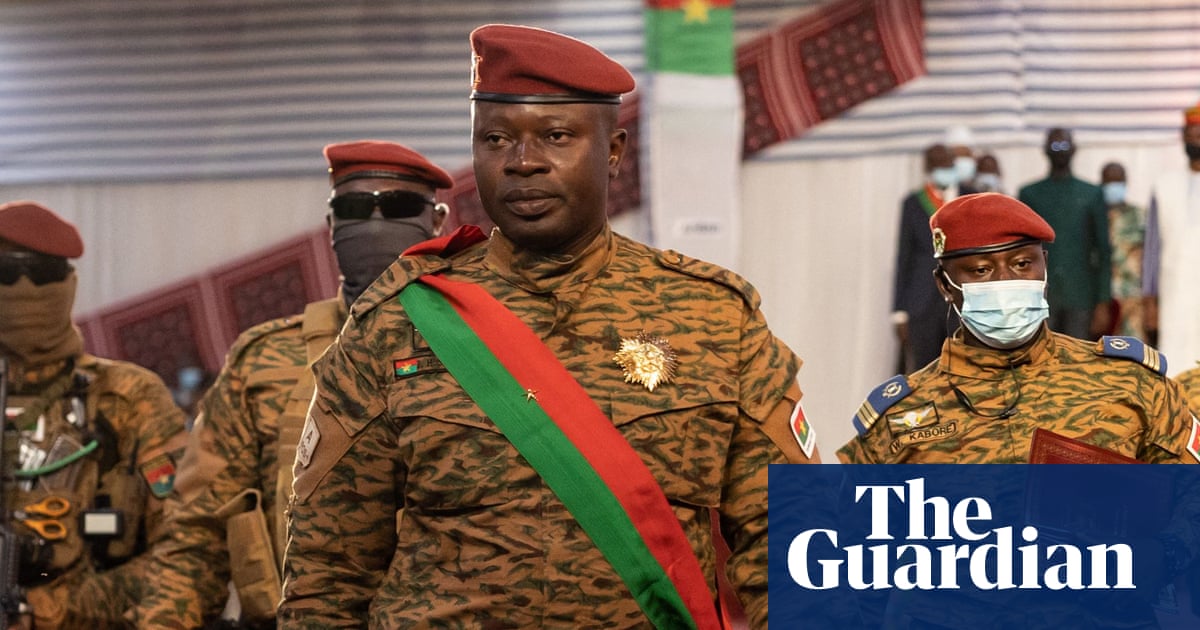
Show caption Lt Col Paul-Henri Sandaogo Damiba, pictured at his inauguration ceremony in March, decreed three days of mourning on Tuesday after the weekend attack. Photograph: Olympia de Maismont/AFP/Getty Images Burkina Faso Burkina Faso: dozens more bodies found after militant attack Provisional death toll rises to 79 as search for victims is hampered by fears of booby traps Agence France-Presse in Ouagadougou Tue 14 Jun 2022 15.35 BST Share on Facebook
Share on Twitter
Share via Email
Burkina Faso says 29 more bodies have been found following a massacre by Islamic extremists, raising the provisional death toll to 79, and that the search for still more victims is being hampered by fears of booby-trapped devices planted “by terrorists to mine the site”.
The head of the country’s ruling junta, Lt Col Paul-Henri Sandaogo Damiba, decreed three days of mourning on Tuesday after the weekend attack at the village of Seytenga in northern Burkina, which was one of the bloodiest massacres in a nearly seven-year-old insurgency.
“The terrorists came into the town on Saturday, market day,” a survivor told AFP by phone. “They opened fire as soon as they entered,” which was at around 4pm or 5pm, he said.
“They only aimed at men. They went from shop to shop, sometimes torching it. They opened fire on anyone who tried to run away. They stayed in the town all night,” said the man, who had fled to Dori, the nearest large town.
“As soon as the shooting broke out on Saturday evening, I fled into the bush with my family,” said another survivor. “We stayed there all night before reaching Dori on Sunday morning. We didn’t take anything and we learned that they set fire to homes, so we have lost everything.”
Condemning the attack, the European Union estimated the final toll could reach 100 civilians.
The massacre is the second worst in the history of Burkina’s insurgency, which started in 2015 when jihadists launched cross-border raids from Mali.
Attacks mainly by groups affiliated with al-Qaida and Islamic State have since claimed thousands of lives, while nearly 2 million have fled their homes.
The toll at Seytenga is surpassed only by an attack in Solhan in the north-east of the country last June that left 132 dead, according to an official toll. Local sources say 160 died.
The Soltan attack – and a raid at Inata that killed 57 gendarmes five months later – were key factors behind a military coup in January.
Disgruntled colonels ousted the elected civilian president, Roch Marc Christian Kaboré, battling a wave of unpopularity for his handling of the insurgency.
The new strongman, Sandaogo Damiba, named security his key priority. But after a lull, attacks have resumed. Several hundred civilians and members of the security forces have died in the past three months.
The latest massacre sparked grief and hand-wringing but also calls for stronger commitment in the fight against the jihadists and an appeal for civilians to be armed.
“Where is Burkina going?” the privately-owned daily Le Pays asked in an editorial, deploring the “unparalleled barbarism” of the attack.
“We are witnessing a humanitarian catastrophe in Burkina Faso. Our generation is awaiting a miracle,” said Yéli Monique Kam, a presidential candidate in 2020.
Arouna Loure, a doctor in the transitional legislative assembly, suggested it was: “time to formally arm the public, especially those living in areas facing major security challenges.
“It is better to die defending one’s lands, weapon in hand, than to be a victim of this barbarism in absolute impotence.”
Seytenga had been struck on 9 June in an attack that claimed the lives of 11 police officers. The army then announced that it had killed about 40 jihadists following that raid.
The massacre was “retaliation for the actions of the army which caused bloodshed” within jihadist ranks, government spokesman Lionel Bilgo said on Monday.
In early April, community leaders and fighters from local armed groups began talks with the government’s backing, mainly in the north and east of the country.







